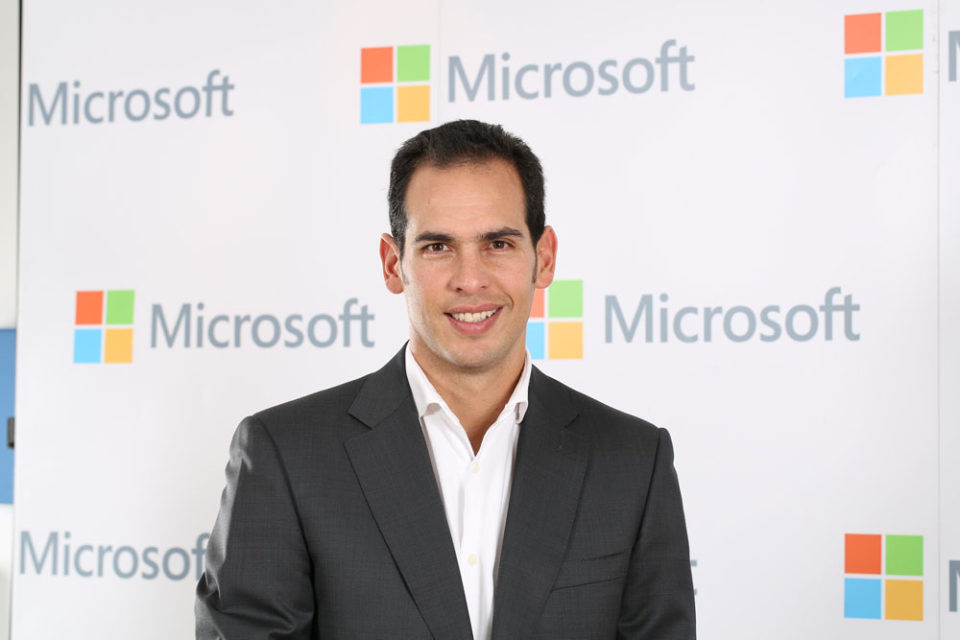Anyone familiar with Jaime Galviz knows that he is passionate about increasing access to digital skills for everyone. As Microsoft Middle East and Africa Chief Marketing and Operations Officer, Jaime is often found speaking on the topic at events and in the media, encouraging decision-makers to ensure youth and working-age populations are adequately equipped with the skills of the future.
“It’s a passion I learned from my father,” Jaime explains. “All he has achieved is based on someone giving him an education opportunity when he was a child. Since then, throughout his life, he has been committed to doing all that he could to help others succeed, and I share that passion today.”
In his role as a member of the Microsoft Middle East and Africa Leadership Team, Jaime is tasked with developing the strategy that will transform the business. With a marketing and operations remit covering the entire region, Jaime also allocates the resources that helps set the local teams up for success.
“Every morning, I have an opportunity to drive impact and create change for our customers, youth and partners. It is an incredibly fulfilling job, and I do not take the responsibility lightly,” Jaime says.
A technology industry veteran with 22 years of experience working for Microsoft, Jaime was drawn to the company because the its mission mirrored his own: to help as many people and organisations as possible achieve more. “I have seen how Microsoft has empowered and transformed external businesses, internal teams and entire countries to realise their potential. That, to me, is extremely gratifying.”
Basking in the opportunity for change
In his experience, Jaime has seen how the pace of change driven by new technologies has presented a need for more lifelong learning, on-the-job training, apprenticeships and other experiences that deliver training in a more nimble manner. It is this belief that birthed Jaime’s passion for Microsoft’s skilling initiatives, run in partnership with nonprofit organisations, government bodies, learning institution and other entities.
Skills development programmes like the Microsoft Cloud Society is one example of how the company is creating opportunities via education and equipping workers with right skills. The programme, which has currently over 152,000 members in the Middle East and Africa region alone, offers a range of free online learning courses and virtual workshops to for members to train on Microsoft technologies at their own pace, in their own time. Microsoft Cloud Society Certificates are also awarded upon completion of each course, to boost career prospects.
“In 2018, Microsoft also partnered with the African Development Bank to launch the Coding for Employment initiative, which aspires to upskill 50 million youth in Africa and create 25 million jobs in agriculture, technology and other key sectors by 2025,” Jaime adds.
More recently, Microsoft launched the first African Development Centre in Kenya and Nigeria. It represents a $100 million investment into Africa by Microsoft, and it is the first Global Development Centre in Africa.
“The ADC will serve as a premier centre of engineering for Microsoft, where world-class African talent can create innovative solutions for local and global impact,” Jaime says. “We are seeking engineering talent from across the continent to work together to find solutions in fields like FinTech, AgriTech and OffGrid energy. To develop and recruit this talent, we are engaging partners, academia, government and developers on the continent. Together with local universities, we are also creating a modern intelligent edge and cloud curriculum, unique to Africa.
Augmenting passion with technology
As a father, Jaime advises his kids to learn as much as they can about a topic that interests them, then consider how technology can augment and impact parts of that field to ultimately help others. In doing so, Jaime says he is raising his kids to be caring and considerate adults, while also encouraging them to think digitally.
Jaime gives similar advice to the youth he interacts with in region as part of his work to promote and encourage the development of digital skills. “It’s important for digitally-savvy people to be agile, ready for virtual teamwork and able to manage change and a portfolio of different topics,” Jaime says. “That’s why I tell young people looking to adopt technology that, as a starting point, they must focus on their project or business topic and look into how technology can contribute to making that new opportunity or complex problem-solving, easier.”
He believes it is equally important for recent graduates transitioning into the workforce to bring new skills that they can share with their colleagues, while companies and governments should create new systems for continuous reskilling. “In fact, to truly be ready for the digital future, I believe every employee within the existing workforce should set aside two to three months annually for constant reskilling,” he says.
Paying it forward
The digital revolution is upon us, and people of all ages should take advantage of opportunities that will help them remain employable and adequately skilled for the future world of work. “That is why, I encourage people of all ages to behold our key human values of being fair, respectful, accountable and ethical, and in doing so, commit to using technology for good. That way, we will raise a digitally-savvy generation that is committed to paying it forward and improving the way of life for all,” Jaime concludes.





